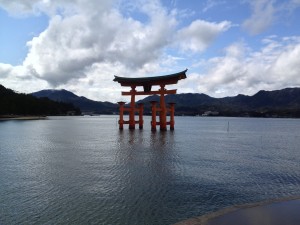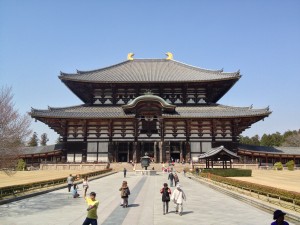I had been to Tokyo once before, but this summer I got the opportunity to return to Japan and study abroad for seven weeks at Senshu University. I couldn’t be more grateful for the opportunity. I learned a lot about the Japanese language, but more importantly, got to experience the culture and make friends from all over the world.
We were able to experience many aspects of Japanese culture, traditional and modern. One of my 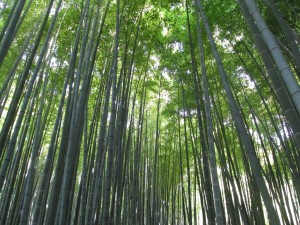 favorite days this summer (despite the humid heat) was the trip to Kamakura, an old part of Japan just outside of Tokyo that houses many shrines and temples. We went to half a dozen shrines that day. At one we hiked up the side of a hill where the hydrangeas were blooming. After, we all got paper fortunes- omikuji. The next shine was Daibustu, with a giant statue of Buddha. At another shrine, we hiked through a forest of tall bamboo. And at another, we saw a traditional Japanese wedding taking place in the bright red building in the center. Before we returned that day, we also went to the beach at Enoshima and one of our Canadian friends got to see the ocean for the first time. On other
favorite days this summer (despite the humid heat) was the trip to Kamakura, an old part of Japan just outside of Tokyo that houses many shrines and temples. We went to half a dozen shrines that day. At one we hiked up the side of a hill where the hydrangeas were blooming. After, we all got paper fortunes- omikuji. The next shine was Daibustu, with a giant statue of Buddha. At another shrine, we hiked through a forest of tall bamboo. And at another, we saw a traditional Japanese wedding taking place in the bright red building in the center. Before we returned that day, we also went to the beach at Enoshima and one of our Canadian friends got to see the ocean for the first time. On other 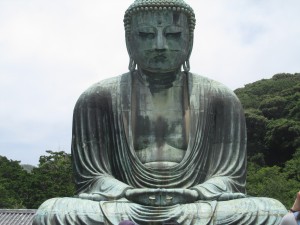 occasions we went to Kabuki theatre and a folk museum.
occasions we went to Kabuki theatre and a folk museum.
The streets of Tokyo are crowded, much different than Oregon where I have spent my whole life. Sometimes the crowded trains and thoroughfares could be overwhelming, but there was also an energy there that I miss. It’s weird to leave my house now and not be around hundreds of people at a time. Tokyo is the biggest and most populous city in the world, and I think even if I spent 7 years there, let alone the seven months I had, I don’t think I would even begin to scratch the surface of all it has to offer. It made every day that we went to the metropolitan area an adventure.
But by far the most rewarding aspect of my time abroad is the new friendships that I forged there. Classes were long, but we still had plenty of time afterwards just to explore Tokyo and spend time with the other students.Whenever we made plans, whether we were going across Tokyo to Ikebukuro or Akihabara or just walking down near the train station for karaoke, it was always an invitation. Everyone was so open and inviting. And since we lived in an international dorm with students from all around the world, on any given day, I would be hanging out with not just Americans and Japanese, but I also made bonds with new Korean, Chinese, French, Vietnamese, German, Canadian, Italian, and English friends. They have, all of them, opened my eyes to the world.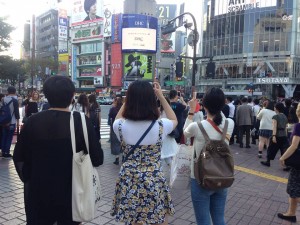 Overall, the experience made me aware of how big the world is. It can be so easy to get caught up in our comfortable lives, not even really aware of just how much goes on outside of our own city, state, or country. I hope I never lose the perspective of how much else there is out there, and how many people there are with completely different experiences. In meeting so many friends from around the globe, it opens your eyes to how easy it is to make a bind with people who may seem completely different from yourself on the surface.
Overall, the experience made me aware of how big the world is. It can be so easy to get caught up in our comfortable lives, not even really aware of just how much goes on outside of our own city, state, or country. I hope I never lose the perspective of how much else there is out there, and how many people there are with completely different experiences. In meeting so many friends from around the globe, it opens your eyes to how easy it is to make a bind with people who may seem completely different from yourself on the surface.
-Blair Prater, Summer 2016
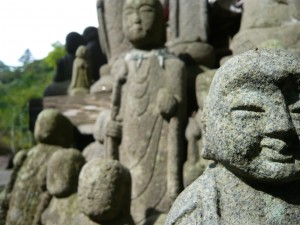 Living in a 14th century Buddhist Zen temple in the heart of the incredibly culturally rich city of Kyoto was a surreal experience — sleeping on tatami mats, raking the pebbles of the gardens in the morning, eating native cuisine while sitting cross-legged in a circle, hearing the monks ring the bronze bells to signify that it’s time for meditation, seeing the ancient hardware-free wood joinery of my new home’s construction, being careful to not step on the entry threshold, removing shoes before walking onto the sacred floors — the authenticity of these five weeks were filled with wonderment, mindfulness and endless pleasant sensory surprises — everything was so new to me. Before arriving, I was a little worried I might feel a bit uncomfortable in a place so geographically and culturally distanced from the rural Appalachia in which I grew up. Instantly, though, I felt as though I was fully meant to be exactly where I was.
Living in a 14th century Buddhist Zen temple in the heart of the incredibly culturally rich city of Kyoto was a surreal experience — sleeping on tatami mats, raking the pebbles of the gardens in the morning, eating native cuisine while sitting cross-legged in a circle, hearing the monks ring the bronze bells to signify that it’s time for meditation, seeing the ancient hardware-free wood joinery of my new home’s construction, being careful to not step on the entry threshold, removing shoes before walking onto the sacred floors — the authenticity of these five weeks were filled with wonderment, mindfulness and endless pleasant sensory surprises — everything was so new to me. Before arriving, I was a little worried I might feel a bit uncomfortable in a place so geographically and culturally distanced from the rural Appalachia in which I grew up. Instantly, though, I felt as though I was fully meant to be exactly where I was.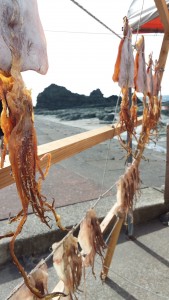 language. Setting out with books and paints in tow, my expectations were to spend a summer keeping myself entertained — self-work and inner-reflection were on my to-do list as was meditating and practicing yoga daily.
language. Setting out with books and paints in tow, my expectations were to spend a summer keeping myself entertained — self-work and inner-reflection were on my to-do list as was meditating and practicing yoga daily. This only brushes on a sliver of the generosity I was shown in the first 48 hours of my tour. And, without exaggeration, this was typical for the entirety of my 48 day journey. I was overwhelmed with the kindness and hospitality consistently poured in my direction on a daily basis. I didn’t know what I had done to deserve it, or how I could ever repay these miracle workers, but I didn’t want to turn down any opportunities to bond with such lovely people; I didn’t want to miss out on a story that could make this adventure all the more enriching. I found myself falling more and more in love with life with every shared smile and laugh.
This only brushes on a sliver of the generosity I was shown in the first 48 hours of my tour. And, without exaggeration, this was typical for the entirety of my 48 day journey. I was overwhelmed with the kindness and hospitality consistently poured in my direction on a daily basis. I didn’t know what I had done to deserve it, or how I could ever repay these miracle workers, but I didn’t want to turn down any opportunities to bond with such lovely people; I didn’t want to miss out on a story that could make this adventure all the more enriching. I found myself falling more and more in love with life with every shared smile and laugh. obligated to, but because it brings so much mutual joy. I hope to always feel that there’s room and time in my life to share it with those who pass through it, even if I realize that they might not extend identical offerings in return, but solely because the universe aligned us at a certain time and place. Japan restored my faith in the goodness of humanity, and I intend to carry this mantra with me wherever I may go or wherever I might be.
obligated to, but because it brings so much mutual joy. I hope to always feel that there’s room and time in my life to share it with those who pass through it, even if I realize that they might not extend identical offerings in return, but solely because the universe aligned us at a certain time and place. Japan restored my faith in the goodness of humanity, and I intend to carry this mantra with me wherever I may go or wherever I might be.